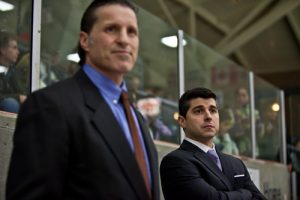By: Dylan Webb
The 2017–18 British Columbia Intercollegiate Hockey League (BCIHL) season is winding down as early in the year as it ever has for the SFU men’s ice hockey team. Therefore, it is an appropriate time to reflect on some of the highs, lows, people, and notable events that comprise the 12-year BCIHL history of what has been a successful organization. With the program having existed in its current form for what is now 12 seasons of highly competitive intercollegiate hockey and having missed the playoffs in just one of those seasons, the team is deserving of some recognition of the variety of factors that have made it one of the strongest organizations in the league year in and year out.
The team plays its home games at the Bill Copeland Sports Centre, just minutes down the hill from the Burnaby SFU campus. Though SFU did field some sort of hockey team in the late 1970s, not much is known or documented about the team at that time and thus for the purposes of this historical review the birth date of the SFU hockey program coincides with the birth of the BCIHL in 2006. Playing in what is now a six-team league that includes cross-town rival Trinity Western University, the team hosts its regular season and playoff BCIHL games at the Bill Copeland Sports Centre as well as special events such as the Great Northwest Showcase and the University Hockey Classic. The Clan hockey team have also travelled to a variety of National Collegiate Athletic Association (NCAA) Division 1 schools for exhibition matches. From Anchorage and Fairbanks Alaska in 2017 to Boston, North Dakota, and Ohio in previous years, the team has crossed much of North America in its storied history. Recently, the organization, in partnership with SFU Athletics, has considered jumping the team into NCAA athletics alongside much of SFU’s other athletic programs. This would mark a significant evolution of the program from its humble beginnings as part of the three team BCIHL were NCAA certification to come to fruition.
As far as personnel is considered, head coach Mark Coletta has been a steady influence on the organization since soon after its inception into the BCIHL. Having been named head coach of the Simon Fraser University men’s hockey team in July 2008, coach Coletta has coached the Clan to two BCIHL Championship victories and five total appearances in the BCIHL Finals and continues to steer the team both on and off the ice with respect to recruiting and management. He has been named the league’s Coach of the Year twice and also holds the distinction as the BCIHL’s all-time wins leader, as a coach, with a regular season record of 130–39–12 over eight seasons. Coletta’s on-ice presence is complimented by the hard work behind the scenes of director of hockey operations Chris Munshaw who is in his first year as league commissioner as well.

Previous to this season in which the Simon Fraser University men’s hockey team have missed out on the playoffs for the first time in the organizations BCIHL history, the Clan had taken part in playoff action in 11 straight seasons. As a founding member of the BCIHL, SFU hockey has consistently been one of the top teams in the league with respect to both regular season and playoff success. The Clan has won the BCIHL championship three times which is second only to the Selkirk College Saints (four titles) and have won the regular season title a total of eight times including in seven straight seasons from 2008–14. Even this season, the Clan has only missed the playoffs due to an internal organizational error with respect to the academic eligibility of one of the players that had been on the roster the entire season. Without a ruling by the player eligibility committee that SFU be forced to forfeit almost half of their games played this season, the team would have clinched a playoff berth for the 12th straight season.
The Clan have certainly produced some of the BCIHL’s most legendary talents as current players such as Mathew Berry-Lamontagna, Brandon Tidy, Brendan Lamont, Tyler Basham, Mak Barden, and Lyndon Stanwood complement a powerful Clan alumni class. This class is headlined by Clansmen such as Jono Ceci, Paul Moscone, Graham Smerek, and Nick Sandor among other alumni. Goaltender Stanwood, on the final day of the regular season of his final year as a member of the SFU hockey team, clinched the honour of most winningest SFU goaltender in team history with his 30th BCIHL win. Unfortunately, Stanwood was unable to achieve a BCIHL Championship in his three years with the team, but his individual statistics undoubtedly make him one of SFU’s most memorable goaltenders. The Clan can also boast about having had the highest scoring player in BCIHL history wear the red and white of SFU hockey for five years. Jono Ceci, a 1990-born North Vancouver native, remains the league leader in points scored with an astonishing 177 points in 108 games played. Without a doubt, the Clan’s rich history of regular season and playoff success as a team is complemented by the organization’s demonstrated ability to recruit and develop some of the most dominant players the BCIHL has ever seen.
All in all, as SFU hockey staff, coaches, and players begin to process the reality of a long summer without playoff hockey for the first time in the organization’s existence, a broader historical overview of the generally successful history of SFU hockey can help lessen the immediate sting of a lost season this year. What is clear is that the team has become accustomed to a degree of success on the ice that they were unable to achieve this year and therefore the team, with its crop of returning players surely to be complimented by some fresh recruits to replace the six departing seniors, will be hungry to restore its status as perennial playoff contender.